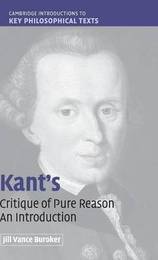
|
Kant's 'Critique of Pure Reason': An Introduction
Hardback
Main Details
Description
In this introductory textbook to Kant's Critique of Pure Reason, Jill Vance Buroker explains the role of this first Critique in Kant's Critical project and offers a line-by-line reading of the major arguments in the text. She situates Kant's views in relation both to his predecessors and to contemporary debates, explaining his Critical philosophy as a response to the failure of rationalism and the challenge of skepticism. Paying special attention to Kant's notoriously difficult vocabulary, she explains the strengths and weaknesses of his arguments, while leaving the final assessment up to the reader. Intended to be read alongside the Critique (also published by Cambridge University Press as part of The Cambridge Edition of the Works of Immanuel Kant in Translation), this guide is accessible to readers with little background in the history of philosophy, but should also be a valuable resource for more advanced students.
Author Biography
Jill Vance Buroker is Professor of Philosophy at California State University. Her publications include Antoine Arnauld and Pierre Nicole: Logic or the Art of Thinking (1996).
Reviews"...I certainly intend to assign this book in future courses on the Critique of Pure Reason, and I am confident that all other teachers of Kant will find their students deeply grateful if they do so as well." --Paul Guyer, University of Pennsylvania: Philosophy in Review
|